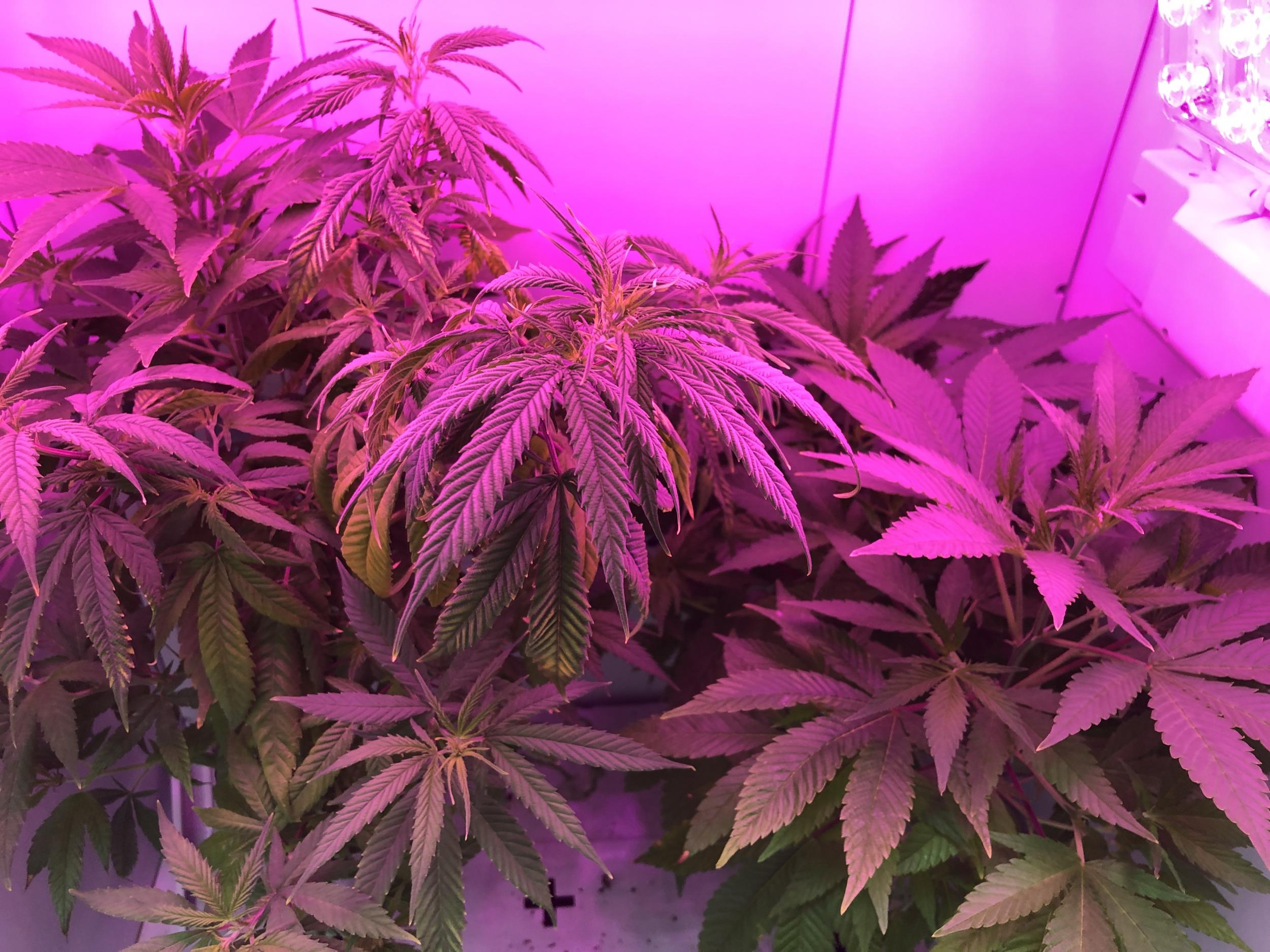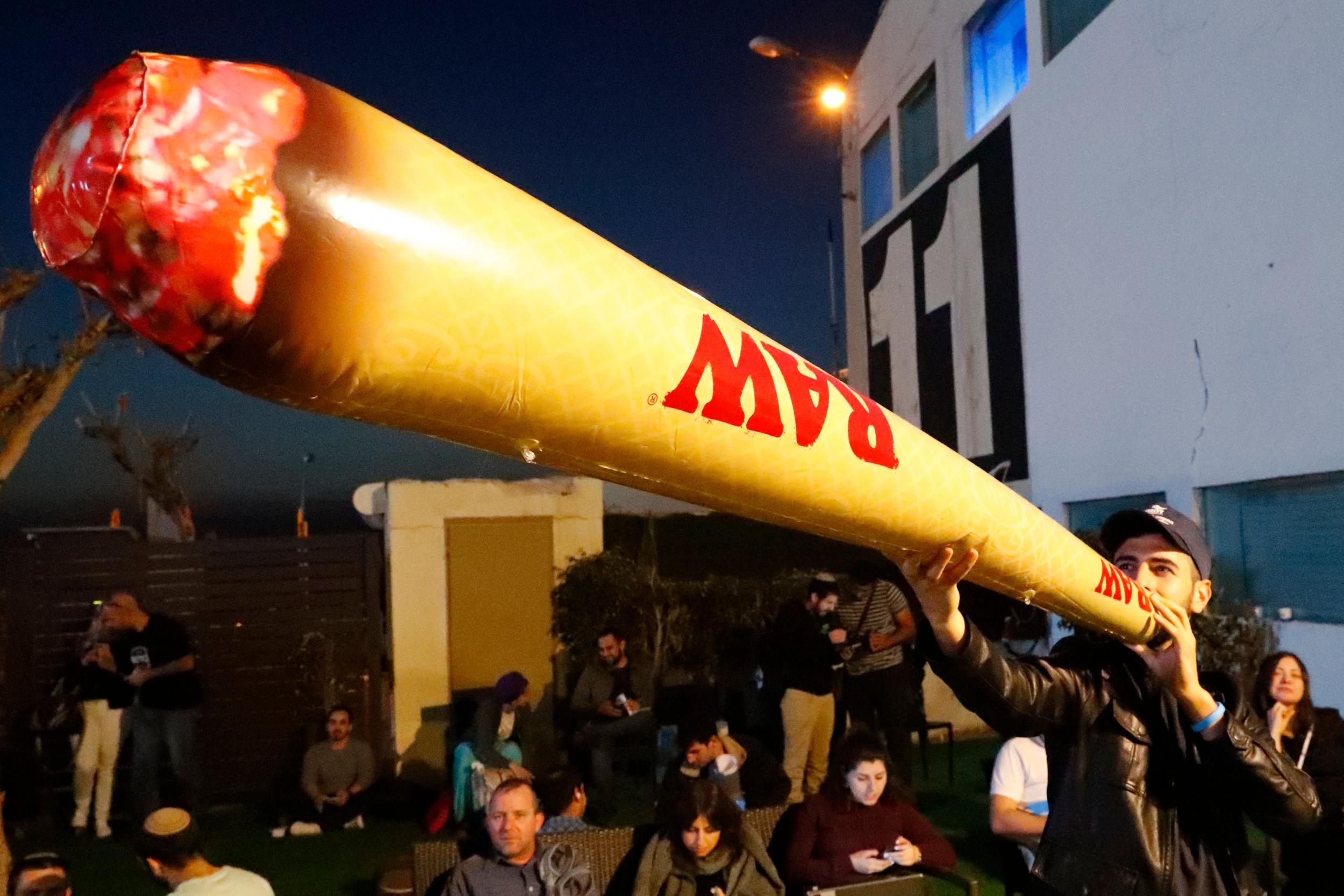Marijuana unlikely star of Israel’s elections as cannabis industry booms
Medical cannabis is legal in Israel, but recreational use of the drug is still banned. Bel Trew looks at the emerging industry
Your support helps us to tell the story
From reproductive rights to climate change to Big Tech, The Independent is on the ground when the story is developing. Whether it's investigating the financials of Elon Musk's pro-Trump PAC or producing our latest documentary, 'The A Word', which shines a light on the American women fighting for reproductive rights, we know how important it is to parse out the facts from the messaging.
At such a critical moment in US history, we need reporters on the ground. Your donation allows us to keep sending journalists to speak to both sides of the story.
The Independent is trusted by Americans across the entire political spectrum. And unlike many other quality news outlets, we choose not to lock Americans out of our reporting and analysis with paywalls. We believe quality journalism should be available to everyone, paid for by those who can afford it.
Your support makes all the difference.In a campaigning field inundated with some of the Middle East’s heaviest issues, from the threat of a new war with Gaza and the occupation of the Golan Heights, marijuana has emerged as a hot topic in Israel.
Legalised for medical use over 20 years ago, the drug was licensed for export earlier this year, and ahead of a general election next week, the question of recreational legalisation is now being used as a campaigning tool.
For Uri Zeevi, of Seedo, one of many entrepreneurial companies in Israel that are fast taking the global marijuana industry by storm, the topic entering the mainstream conversation can only be a positive sign of the inevitable decriminalisation of the drug.
Seedo’s product, developed in the city of Yokneam Illit in northern Israel, allows users to grow marijuana in small home labs, and follow through an app a live-stream of the cannabis plant growing, with its needs being monitored and met by artificial intelligence.
The company has specific “growth” plans for hundreds of strains of cannabis, a notoriously sensitive plant, as well as some leafy greens and vegetables.
The fridge-like containers, which control temperature, humidity, nutrients and lighting, learn from each growth cycle. The app crowd-pools information from all users to perfect the plan for each strand of the drug.
The company currently has over 3,000 orders from across the world for the $2,400 ($1,800) apparatus that can produce up to 400g of perfectly grown cannabis every 12 months.
“Within the year you’ll make back your investment on the home labs,” Uri Zeevi, chief marketing officer of Seedo, tells The Independent.
“It’s hermetically sealed, so if you’re in a Nepalese mountain climate or the Sahara desert your plant, your specific strand, will thrive.”
Seedo is also in the process of producing industrial-sized stackable containers, allowing companies to create the highest-grade medical cannabis from anywhere, even the roofs of skyrises.
While medical cannabis is legal in Israel, the recreational use of the drug is still banned. Zeevi is part of a growing movement within the country which want that to change.
“Once it’s legal here, the cannabis industry could produce a lot of jobs, and generate immense funds through taxes. Cannabis exists whether or not its legalised. The question is who is going to enjoy the revenues, the government or the black market?” he asks.
The cannabis debate and the argument for its legalisation have for years been relegated to the fringes of left-wing political platforms in Israel.
It was the often-ignored rallying cry for small parties like Green Leaf, which since its foundation in 1999 has never managed to secure a seat in the Knesset.
But this year the familiar yet maligned multi-fronded plant has become the unlikely star of the Israeli elections, crossing party divides and most unusually becoming a campaign platform for the right.
Cannabis exists whether or not its legalised. The question is who is going to enjoy the revenues, the government or the black market?
Up until recently, the drug has been frowned upon in Israel, which has large conservative Jewish and Muslim communities.
Pot-smoking could in the past lead to Israelis being disqualified from military service.
Last month Israeli police arrested dozens of people suspected of using Telegrass, an encrypted messaging app that allowed Israelis to get marijuana delivered to the door of their homes.
But it is also not uncommon for people to smoke pot in public: even though it is technically illegal, law enforcement has been increasingly lenient.

The medical use of marijuana has been permitted since the early 1990s, and has become increasingly popular across all strands of society, driving an interest in the drug.
The upcoming general election, taking place next week, has been intermittently overshadowed by the spectre of war with Gaza, and the possible indictment of sitting prime minister Benjamin Netanyahu.
But beyond the international headlines and well-worn talking points, a lively debate around the drug is now taking centre stage at home.
In early 2019, the Israeli government finally approved the export of Israeli-grown medical cannabis, opening up the pioneering and bustling domestic market to the world.
This week the country edged one step further to legalising the drug for recreational purposes by decriminalising personal possession of it.
Use of it in a small amount in personal homes is now no longer an offence. Public consumption for personal use will result in a fine of just over £200 rather than a potential three-year jail sentence.
And now politicians like Netanyahu, who have largely ignored the drug in previous elections, are eyeing it as a way to draw in a younger electorate.
The head of the right-wing Likud Party said a few weeks ago that he would consider legalising the drug if he were to be re-elected. He vowed to increase the use of medical cannabis “to one of the highest levels in the world”.
His promise came after polls showed newly formed far-right Zehut party surging in popularity on the back of its promise to decriminalise the drug.
Polls initially predicted the libertarian group would be unable to pass the threshold to get a single place in the Knesset, but a poll this week from Channel 12 has the party securing five seats.

Zehut, which means “identity” in English, is led by firebrand Orthodox settler Moshe Feiglin, once a Likud member of the Knesset himself. He is infamous for denying the existence of a Palestinian people and being arrested in the 1990s for sedition against the state for his protests against the Oslo Peace Accords.
His party members say he became an unlikely champion of cannabis after sick relatives of his relied on it for medical purposes.
“In the last year Moshe was in parliament wanting to get full legalisation of cannabis, knowing that without full legalisation there will be people who need medical cannabis but who cannot access their medicine,” says Libby Molad, fifth in Zehut’s list and so a possible future MP.
“There are probably more than 1 million leisure cannabis users in Israel and all of them are regarded as criminals. This is insane in a country of around 8 million. It is no different from liking a glass of wine,” she adds, speaking to The Independent.
She says that Israel could easily be at the “forefront of cannabis production and research”.
“Think of the jobs it could create, the revenues,” Molad adds.
And so it makes good business sense to put it at the forefront of a political campaign.
According to a recent report by Arcview Market Research, worldwide legal cannabis spending could hit $16.9bn this year and soar to $31.3bn in 2022.
The biggest market for production of cannabis is currently Canada, largely because the United States is unable to import or export the plant due to it being illegal at a federal level.
But the weather in Canada is not best suited for the production of cannabis, which is where Israel could find a global foothold.
Officials told Haaretz newspaper that estimated related trade deals could bring in as much as 1 billion shekels (or £208m) a year in tax revenues.
Many politicians are already cashing in.
Israel’s former prime minister and the country’s ex-Labour Party chief Ehud Barak has been labelled one of Israel’s “marijuana millionaires” by local media after he became chair of a company that owns cannabis developer Canndoc.
He was quoting as saying at a cannabis tech conference this week in Tel Aviv that Israel is the “land of milk, honey and cannabis”.
CEOs in the industry agree. Israel, known for its startups, agro-tech, research and good weather, appears well suited for the booming industry.
Israel has also been at heart of research into the drug. It was Israeli scientists Raphael Mechoulam and Yechiel Gaoni who first discovered Tetrahydrocannabinol (THC), the principal psychoactive constituent of cannabis, in 1964.
There are probably more than 1 million leisure cannabis users in Israel and all of them are regarded as criminals. This is insane in a country of around 8 million. It is no different from liking a glass of wine
Oren Shuster of International Medical Cannabis (IMC), which has been growing cannabis for a decade and has greenhouses near to the border with Gaza, says that producing cannabis in Israel is three times cheaper than growing in places like Canada.
“Israel’s climate is the perfect condition for growing. Our cost structure is much lower because we are growing in greenhouses, we don’t need additional heat or artificial lights. We have the greatest natural resource: good weather and sun,” he tells The Independent.
IMC currently produces three tons of medical cannabis annually for a domestic market but is preparing to increase that capacity to 150 tons a year to meet expected international demand.
Shuster, once a critic of the drug, now hopes it will be legalised, claiming the drug has health benefits from skin to mental health. But multiple studies have shown that smoking marijuana can lead to the development of mental health problems.
Currently his farms are the only ones in the world in which post-harvest of the flower is fully automated. The use of robots specially designed in Israel makes savings of up to 90 per cent, he claimed.
“I believe in a few years’ time Israel will be an empire in cannabis innovation and research. There is already a vibrant startup hive surrounding it.”

Join our commenting forum
Join thought-provoking conversations, follow other Independent readers and see their replies
Comments